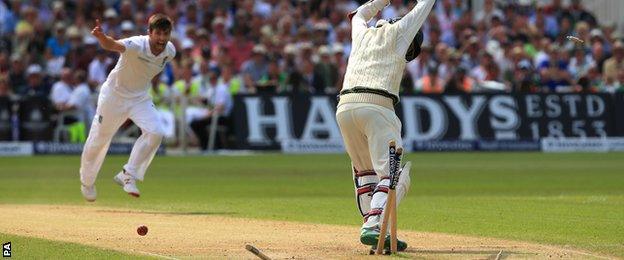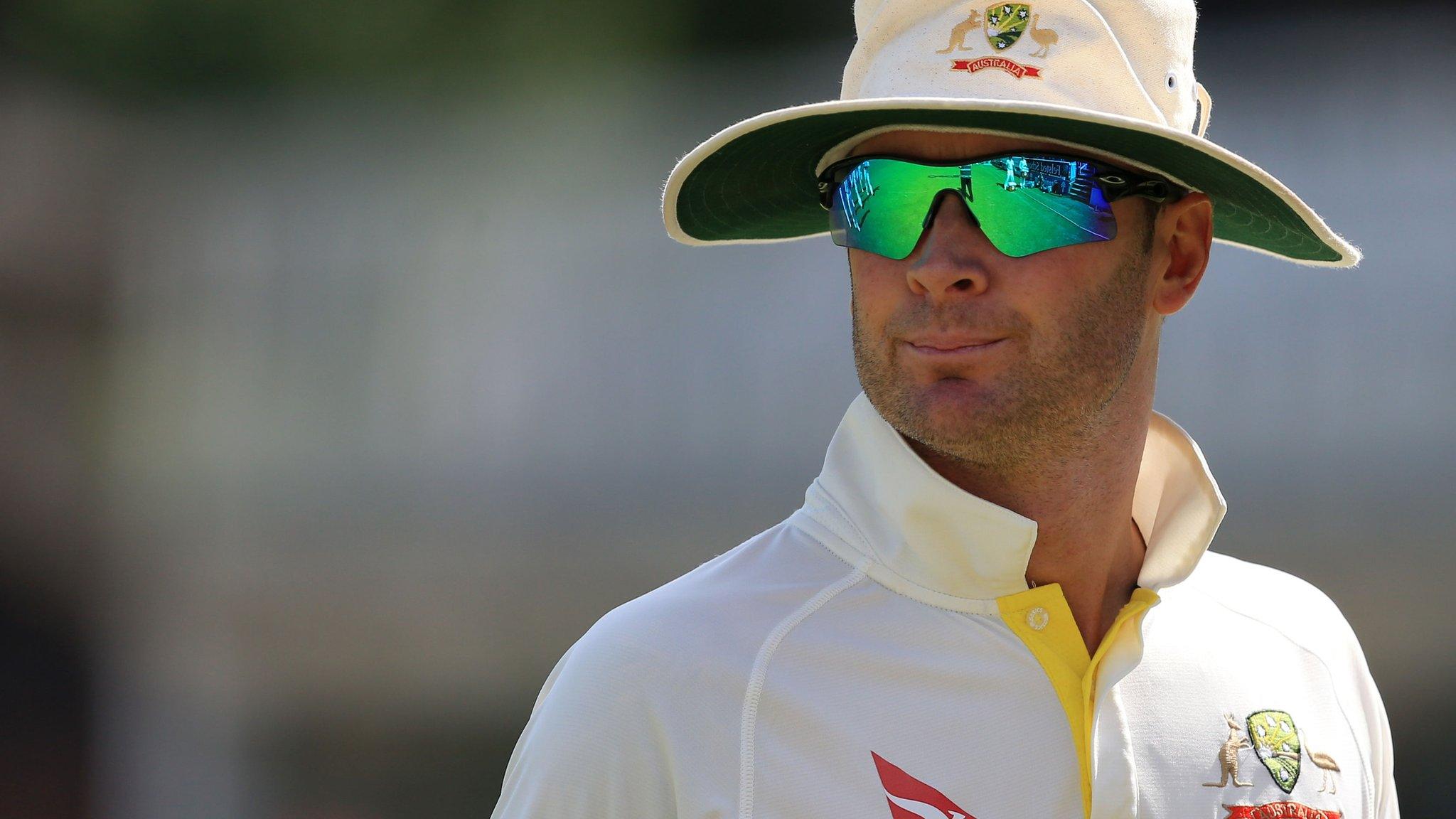Ashes 2015: 'A fitting end to a series of rapid change'
- Published
- comments

Mark Wood (centre) took the winning wicket of Nathan Lyon
It began with fireworks and Land of Our Fathers on a damp Cardiff outfield and ended as a contest exactly one month later with Nathan Lyon's stumps splattering one hour and 20 minutes before lunch on a sun-kissed Saturday in Nottingham.
This has been a series of unreal pace and unfathomable change, and its conclusion was entirely in keeping: England's Mark Wood riding an imaginary horse around the Trent Bridge outfield; Ben Stokes downing a bottle of beer in one by the old pavilion; Australia captain Michael Clarke retiring from international cricket three months after winning the World Cup, five days of cricket after his side had drawn level with a 405-run victory and 24 hours after insisting he was fighting on.
Even as Joe Root was receiving a champagne shampoo from his cavorting team-mates, there was an air of disbelief about it all. And why not?
Eighteen months ago England were being thrashed 5-0 down under, Alastair Cook's last act in that series to be lbw in Sydney playing no shot to his second ball. Four months ago they were coming back from the World Cup in disgrace, having been beaten by Bangladesh and having failed to even get out of the group stage. Less than three months ago they were sacking their coach for the second time in a year.
To build an Ashes-winning team from those foundations of sand is remarkable enough in itself. But it is in the flair and pace that they have done so which sets this triumph apart.
England win the Ashes. Read more... |
|---|
Not since the 19th century have England won four home Ashes series in a row. Not in 30 years have they won a home Ashes Test by an innings. And yet by the end it was no surprise at all, the new Ashes order as secure as it was unimaginable four breathless weeks ago.
How good was this Ashes of 2015? It has been a summer of unforgettable sessions but only occasional tension, of matches won at unprecedented pace and thrown away with remarkable profligacy, of new heroes like Stokes and Root and the enforced farewell of old stagers like Clarke and his vice-captain Brad Haddin.
The overall balance of power initially see-sawed. An England win by 169 runs, an Australian victory by 405, that total dominance succeeded by an eight-wicket capitulation less than a fortnight later.
In the individual matches, it was contrastingly one-sided. Not this time the knee-knocking tension of Edgbaston 2005, the last-gasp draw of Cardiff 2009 or the 15-run margin of victory in the corresponding Ashes Test at Trent Bridge two summers ago.

Mark Wood took two Australian wickets on the morning of day three
There has been cut and thrust but never in the same match. The side that wins the first day wins the game.
These have felt like two flawed sides. England were bowled out in 37 overs at Lord's, Australia in 36 in Birmingham and then 18.3 in Nottingham.
The difference between the two is the direction they are taking. England are on the ascent, Australia plummeting back down at an alarming rate.
Only one England batsman, Root, has scored a century. It has not mattered, because whenever his team have needed a bowler, one of the attack has taken charge.
In Cardiff it was Moeen, seeing off Australia's best batsman and then their captain. In the first innings at Edgbaston James Anderson took 6-47; in the second, Steve Finn 6-79. At Trent Bridge it was the turn of Stuart Broad with that extraordinary 8-15, and then Stokes with his Flintoff-esque 6-36 in the glorious finale.
From 0-5 to 3-1: England series results | |
|---|---|
Series | Result |
2013-14: Away against Australia | Lost 5-0 |
2014: Home against Sri Lanka | Lost 1-0 |
2014: Home against India | Won 3-1 |
2014: Away against West Indies | Drew 1-1 |
2015: Home against New Zealand | Drew 1-1 |
2015: Home against Australia | Winning 3-1 with one to play |
It is the first time in Test history that four different bowlers in a team have taken six wickets in consecutive innings. In contrast, Australia's bowlers have been soloists and occasionals.
Mitchell Starc has blown hot and cold. Mitchell Johnson went for 100 in the first Test, blew England away in the second, produced two sensational deliveries amongst the mundane in the third and went away for another ton in the fourth.
Catches won matches. From Alastair Cook's diving slip catch off David Warner in Cardiff and reflex effort at short midwicket to dismiss Haddin in the second innings, England's fielding has been as inspired as it was desultory in the preceding whitewash down under - Root exemplary at third slip, Stokes impossible at point in hanging on to Adam Voges on that flat-out first morning in Nottingham.

Former England captain Sir Ian Botham tweeted his congratulations
Records fell as fast as the wickets - the shortest ever first innings of a Test, the best ever figures for a pace bowler in the Ashes.
The iconic sessions that produced them will also go down in Ashes folklore: the afternoon on the first day at Edgbaston, when Australia lost seven wickets for 53 runs; the morning on the first day at Trent Bridge, when they somehow lost all 10 for just 60.
And it has all played out at an astonishing pace, not just unrecognisable from the Test cricket of old but - in that first session in the fourth Test - not even T20.
Four days in Cardiff and London, two and a half in Birmingham, two and half a session in Nottingham. You would worry about the duration, but for the home support it was all such thrilling fun.
The Ashes of 2013 had been won at a grind, England's cricket effective yet carefully planned and short of improvisation and inspiration. The urn was retained in the rain at Old Trafford and raised in the drizzle and darkness at a half-empty Oval.

England bowler Steven Finn tweeted after the game
This has felt more like 2009, the rebirth of a team from a similarly parlous state, a new coach and new style emerging with every day that passed, the moment of triumph witnessed by a full house in full party mood.
Just as Darren Lehmann's appointment in June 2013 revitalised an Australian side playing uncharacteristic cricket with little contentment, so Trevor Bayliss's arrival on the series' eve transformed England.
Australia turned out to be far less than the side they thought they were, but much of that comes down to England's plans. Australia stuck to their guns by repeating charging straight down the barrel of the opposition's. England preferred the cerebral and the subtle as well as the unfettered - going round the wicket to nullify Chris Rogers, putting a man in at deep point to catch Steve Smith, luring in the lunging opposition with full length and tempting angles.
This England side has a long way to go. They need to learn to win away, to find a reliable opening partner for Cook, to unearth or trust a spinner capable of winning matches or just holding an end.
But even with the new Premier League season upon us, they have managed to push cricket on to front pages as well as back, and made it look like fun again too. A summer of surprises has ended with smiles.
- Published8 August 2015

- Published8 August 2015
- Published8 August 2015

- Published29 July 2015

- Published8 August 2015

- Published7 July 2015

- Published10 March 2019

- Published15 May 2018

- Published18 October 2019
